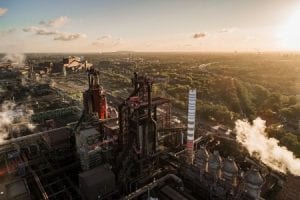Recycling company TSR Recycling GmbH & Co. KG and thyssenkrupp Steel will enter into cooperation based on an innovative production process developed by TSR, in which a high-quality recycling product is made from common recovered scrap. The process is to be tested and optimized in a joint project for use in the blast furnaces of thyssenkrupp Steel with the goal of producing the high-quality recycling product in the required quantities.
The project is to strengthen the recycling cycle of iron and steel, while reducing the CO2 emissions of the blast furnaces at the Duisburg site of thyssenkrupp Steel. The development of the pre-processing plant and the continual optimization of the product will take place within the scope of a joint research project. Thereby, this measure complements the hydrogen-based transformation path pursued by thyssenkrupp Steel.

Blast furnaces 8 and 9 at thyssenkrupp Steel site in Duisburg Hamborn. (Source: thyssenkrupp Steel )
Waste products with a high steel content like household appliances or vehicles often end up on scrapyards. As steel can be recycled infinitely, it has an enormous recycling potential. One way of recycling them is in steelmaking itself. Steel scrap is already used for cooling in the production process. As a result, the raw materials contained are reused in the value chain. However, the scrap content in the production of high-quality primary steel is currently still limited – especially on account of its extremely homogeneous composition. However, the new process is now expected to make it possible to increase the recycling rate in steel production.
The TSR process is intended to make an innovative product from common raw materials, namely consumer scrap, the composition and properties of which can be precisely designed. The challenge consists in removing some undesired attended materials from the iron by targeted separation, so that the product is then suitable as a certified raw material for the blast furnace process and can be used sustainably.
Bernd Fleschenberg, COO TSR: “The use of steel scrap in steel production has a long tradition. The joint project of thyssenkrupp Steel and TSR takes us one step further. Our goal is to produce a high-quality and certified product made from common raw materials. This new product will allow us to sustainably cover a considerable percentage of raw material requirements of the European industry. We are thus making an important contribution to climate protection and resource conservation, as well as to achieving the targets under the European Green Deal“.
To produce pig iron and later on steel, it is necessary to deprive the iron ore of oxygen at high temperatures. Coke and pulverized coal are used as so-called reducing agents.
Through the use of the recycled product with a very high iron content, the amount of these reducing agents in the blast furnace can be reduced. This results in a reduction of CO2 emissions. The use of one ton of the recycled product could thus save about one ton of CO2. The project is another element in the transformation path pursued by thyssenkrupp Steel towards climate-neutral steel production and complements planned measures like the injection of hydrogen into the blast furnace, the installation of new direct reduction plants, the Carbon2Chem® technology or other initiatives aimed at reducing CO2 emissions in existing plants.
Dr. Arnd Köfler, CTO thyssenkrupp Steel: “With the transformation of a plant-intensive industry like the steel industry with its long planning horizon, we are setting off on a marathon. The switch to entirely new technologies will take time. It is therefore important that we also take measures in the existing plants and equipment to reduce CO2 emissions: For climate change does not pause. Together with TSR, we are launching a promising project. We strengthen a circular economy that conserves its resources, and we intensify our efforts to reduce CO2 emissions.”
By testing the new recycling product, TSR and thyssenkrupp Steel intend to gain knowledge about its use in the blast furnace – and how it can increase the recycling quota in steel production. Based on these findings, the product is to be further developed and optimized in order to obtain as ideal as possible properties for the use in the blast furnaces of thyssenkrupp Steel. Owing to the advanced measurement equipment and monitoring in place, the blast furnaces of thyssenkrupp Steel offer the ideal basis for the development of the product for steel production. To this end, an industrial-scale production plant will be built to supply the blast furnaces of thyssenkrupp Steel in Duisburg with the required material. The proximity between the steel mill and TSR’s location in Duisburg, one of the largest scrapyards in Germany with an area of well over 130,000 sqm, also offers considerable logistic advantages.
After a successful test phase it is planned to agree upon and ensure the long-term supply of the thyssenkrupp Steel’s Duisburg steel mill from TSR’s site. Currently, the production plant is scheduled to go into operation in the autumn of 2022.